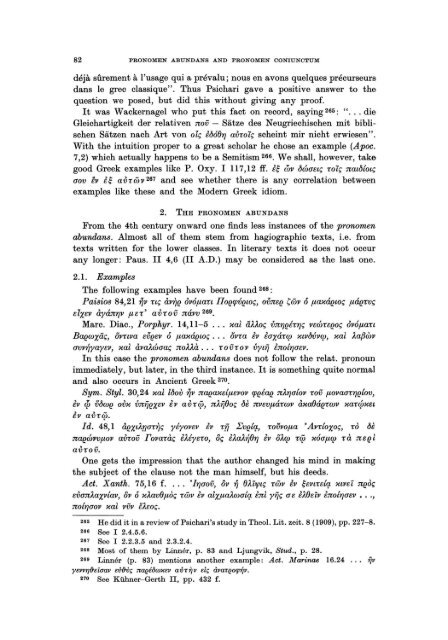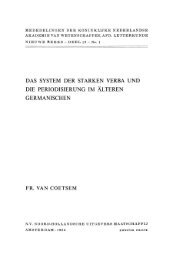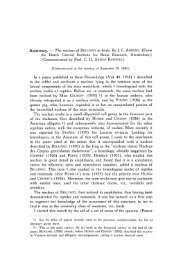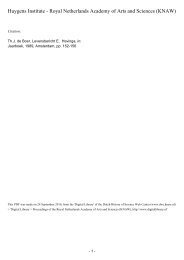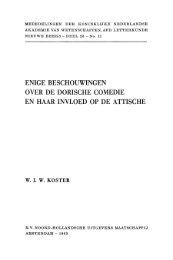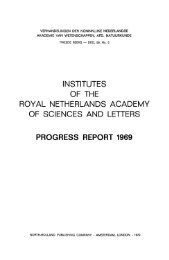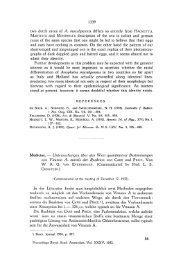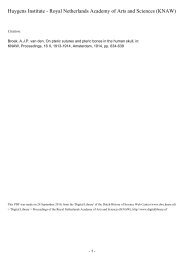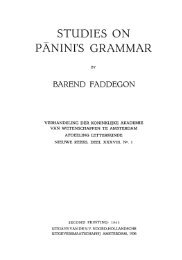Pronomen Abundans and Pronomen Coniunctum. A ... - DWC
Pronomen Abundans and Pronomen Coniunctum. A ... - DWC
Pronomen Abundans and Pronomen Coniunctum. A ... - DWC
Create successful ePaper yourself
Turn your PDF publications into a flip-book with our unique Google optimized e-Paper software.
82 PRONOMEN ABUNDANS AND PRONOMEN CONIUNCTUM<br />
déjà sûrement à l'usage qui a prévalu; nous en avons quelques précurseurs<br />
dans Ie grec classique". Thus Psichari gave a positive answer to the<br />
question we posed, but did this without giving any proof.<br />
It was Wackernagel who put this fact on record, saying 265: " • .. die<br />
Gleichartigkeit der relativen nov - Sätze des Neugriechischen mit biblischen<br />
Sätzen nach Art von olç èbóO'fJ aVToiç scheint mir nicht erwiesen".<br />
With the intuition proper to a great scholar he chose an example (Apoc.<br />
7,2) which actually happens to be a Semitism 266. We shall, however, take<br />
good Greek examples like P. Oxy. I 117,12 ff. U cIJv bwaetç Toiç nal(j[olç<br />
aov tv U aVTWv 267 <strong>and</strong> see whether there is any correlation between<br />
examples like these <strong>and</strong> the Modern Greek idiom.<br />
2. THE PRONOMEN ABUNDANS<br />
From the 4th century onward one finds less instances of the pronomen<br />
abundans. Almost all of them stem from hagiographic texts, i.e. from<br />
texts written for the lower classes. In literary texts it does not occur<br />
any longer: Paus. II 4,6 (II A .D .) may be considered as the last one.<br />
2.1. Examples<br />
The following examples have been found 268:<br />
Paisios 84,21 1}v nç àv~(! ovóf-lan IIo(!cpV(!wç, ovne(! !;wv Ó f-la"áewç f-lá(!TVÇ<br />
elXev àyán'fJv f-leT' aVTov návv 269.<br />
Marc. Diac., Porphyr. 14,11-5 ... "ai (lAAOÇ vn'fJ(!h'fJç vewTe(!oç ovóf-lan<br />
B - tI '7 r- 1 "" 1 ~-~ , '1<br />
a(!wxaç, OVTLVa EV(!eV f3'<br />
0 f-la"a(!wç. " OVTa ev eaxaup "lVuuVep, "al Aa WV<br />
avvrJyayev, "ai àvaAwaaç noAAà . .. ToiiTov vytij èno{rwev.<br />
In this case the pronomen aburulans does not follow the relat. pronoun<br />
immediately, but later, in the third instance. It is something quite normal<br />
<strong>and</strong> also occurs in Ancient Greek 270.<br />
Sym. Styl. 30,24 "ai lbov 1}v na(!a"e{f-levov qJ(!Éa(! nA'fJa{ov TOV f-lOVaaT'fJ(!{ov,<br />
èv 0/ vbw(! ov" vnfj(!xev èv aVTep, nAfjOoç bi nvevf-láTwv à"aOáeTwv "aTep"et<br />
èv aVTep.<br />
Id. 48, 1 à(!XlATlaT~ç yÉyovev èv Tti Ev(!{q., TOvVOf-la 'AvT{oxoç, Ta bi<br />
na(!wvvf-lOV aVTov rovaTàç èAiyeTo, oç èAaArJO'fJ èv OAep Tep "óaf-lep T à ne (! i<br />
aVTOV.<br />
One gets the impression that the author changed his mind in making<br />
the subject of the clause not the man himself, but his deeds.<br />
Act. Xanth. 75,16 f. ... 'I'fJaov, ov ij OA.'i1plÇ TWV èv ~eVlTe{q. "lvei n(!àç<br />
evanAaxv{av, OV Ó "AaVOf-laç TWV èv alXf-laAwa{q. ènl yfjç ae èAOeiv èno{'fJaev •..,<br />
nO{'fJaov "al vVv lAeoç.<br />
265 He did it in a review of Psichari's study in Theol. Lit. zeit. 8 (1909), pp. 227-8.<br />
266 See I 2.4.5.6.<br />
267 See I 2.2.3.5 <strong>and</strong> 2.3 .2.4.<br />
288 Most of them by Linnér, p . 83 <strong>and</strong> Ljungvik, Stud., p. 28.<br />
289 Linnér (p. 83) mentions another example: Act. Marinae 16.24 ... fjv<br />
yevvrr{}ûaav d.{}Vç :n:aeéc5wxev a V r iJ v elç dvareoqnJv.<br />
270 See Kühner-Gerth II, pp. 432 f.


